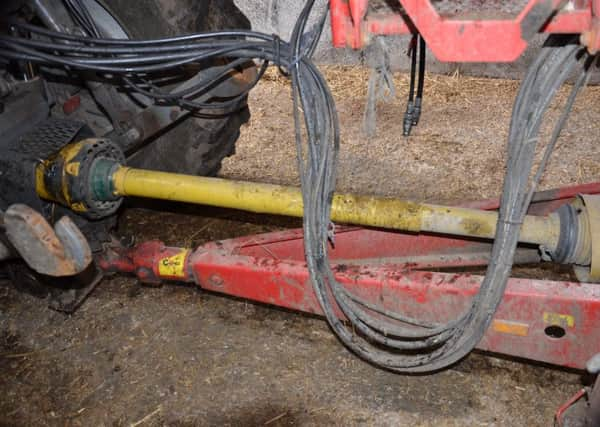Farm Safety Week: Putting safety in the driving seat


Tuesday of Farm Safety Week focuses on Machinery & Transport. Poorly used or faulty vehicles and machinery are a major cause of death and injury on farms. Farmers come into contact with a host of machinery daily - combines, choppers and hay balers which bring their own attendant dangers. Hands, hair and clothing can be caught by unguarded PTO shafts or other unguarded moving parts such as pulleys and belts. People can be injured by front-end loaders, falling from a moving tractor or being struck by its wheels.
Modern farm machinery present many dangers if they are not kept in a good condition, and while they allow farmers to work more quickly and efficiently, safety issues must be adhered Tuesday of Farm Safety Week focuses on Machinery & Transport. Poorly used or faulty vehicles and machinery are a major cause of death and injury on farms. Farmers come into contact with a host of machinery daily - combines, choppers and hay balers which bring their own attendant dangers. Hands, hair and clothing can be caught by unguarded PTO shafts or other unguarded moving parts such as pulleys and belts. People can be injured by front-end loaders, falling from a moving tractor or being struck by its wheels.
Advertisement
Advertisement
Modern farm machinery present many dangers if they are not kept in a good condition, and while they allow farmers to work more quickly and efficiently, safety issues must be adhered mechanic to carry out repairs.
From 2000-2017, there have been seven deaths on Northern Ireland farms confirmed by HSENI, which were attributable to faulty brakes / handbrakes, so it is crucial when parking a tractor that the farmer remains in his seat until the brakes have been applied properly; the slightest incline on where a tractor may be parked can be enough to cause the tractor to roll if the brakes have not been applied properly.
To highlight the issue of Tractor Maintenance, HSENI has produced a new radio advert aimed at making farmers aware of the dangers of ensuring that tractor braking systems are applied properly, or recognising that a tractor has a defective braking system.
The radio advert is aimed at encouraging farmers to recognise the dangers when parking a tractor, and to use the following checklist:
- Make sure the handbrake is FULLY APPLIED
- Make sure all the controls and equipment are left safe
- Turn off the engine AND remove the key
Advertisement
Advertisement
Accidents involving equipment is one of the four areas targeted by the Farm Safety Partnership’s on-going campaign, ‘Stop and Think SAFE’. The four main causes of death and injury on our farms are slurry, animals, falls and equipment (SAFE).
The following Farm Safety checklist should also help you and others to stay safe on your farm:
Always
- keep all guards in place on tractors and equipment, especially PTO guards
- make sure that all mirrors and cameras (if fitted) are clean and fully functional on tractors and telescopic handlers
Advertisement
Advertisement
●- make sure equipment is stopped fully before clearing blockages
●- operate tractors with enclosed safety cabs or roll bars
- take care when mounting or dismounting tractors or telescopic handlers
- keep the brakes on all your machines properly maintained, especially the parking brakes
- only start your tractor from the driver’s seat
- make sure that your tractors starter system works properly
Advertisement
Advertisement
- when pulling heavy machinery equipped with hydraulic brakes, make sure the brakes are connected to the tractor and work properly
Never
- attempt to repair machinery if you do not have the correct tools and equipment and are not competent to do so
- run a tractor down a slope to start it
- work near overhead power lines when tipping trailers or using high reaching machinery
- check hydraulic pipes for leaks by running your finger or hand along them while they are connected and under pressure
Advertisement
Advertisement
Martin Malone, Regional Director in NFU Mutual and a member of the Farm Safety Partnership, said: “Machinery and vehicles continue to be the main causes of life changing and life ending injuries on farms, with 40% of all farm workers who have lost their lives in agriculture over the past decade being workplace machinery-vehicle related.
“The number of farmers losing their lives through farm machinery or vehicle issues continues to be a problem this year, with tragically two fatalities in the space of a week earlier this month. Farm safety training is improving across the country and the Farm Safety Partnership is continuing to communicate directly with farmers across Northern Ireland. In this fifth year of Farm Safety Week, we are, today, launching a new radio advert in relation to tractor maintenance, an important part of our ‘Stop and Think SAFE’ campaign.”
Martin Malone added: “Virtually everybody in farming knows somebody who has been injured or killed in a farming accident. Reminding farmers that farm safety is a lifestyle, not a slogan, seems like the right thing to do this week, given the culture of risk taking in the industry. One day your luck could run out. One day it could be you.
“According to American journalist Henry Mencken ‘Man is a beautiful machine that works very badly’ and unfortunately, as we have seen very recently, agricultural machinery may be advancing with safety features but it is still dangerous so please take a minute to use the SAFE STOP approach - ensure tractors, telehandlers and associated equipment is switched off when doing routine tasks or making routine checks and maintenance and take your time to think about what you are doing and what might go wrong as making a few simple checks could actually save a life – maybe your own!”
For more information on Farm Safety Week visit www.yellowwellies.org or follow @yellowwelliesUK on Twitter/Facebook using the hashtag #FarmSafetyWeek